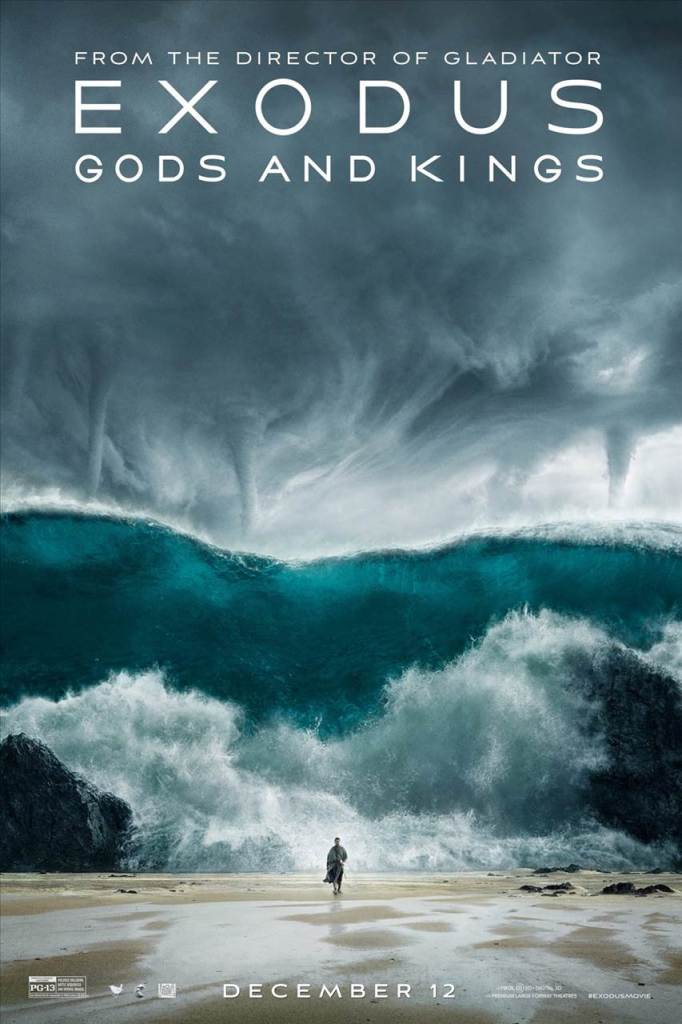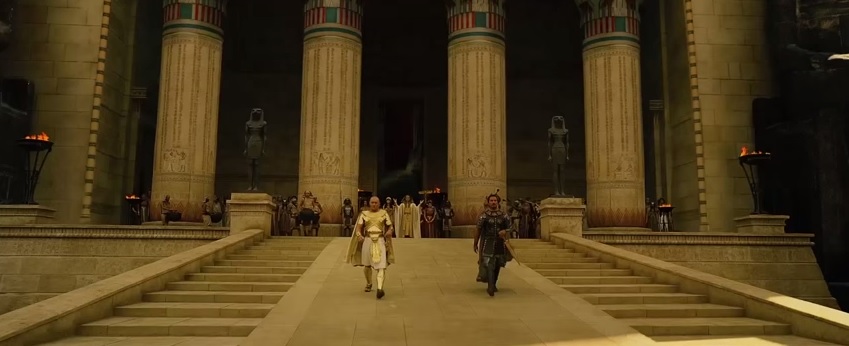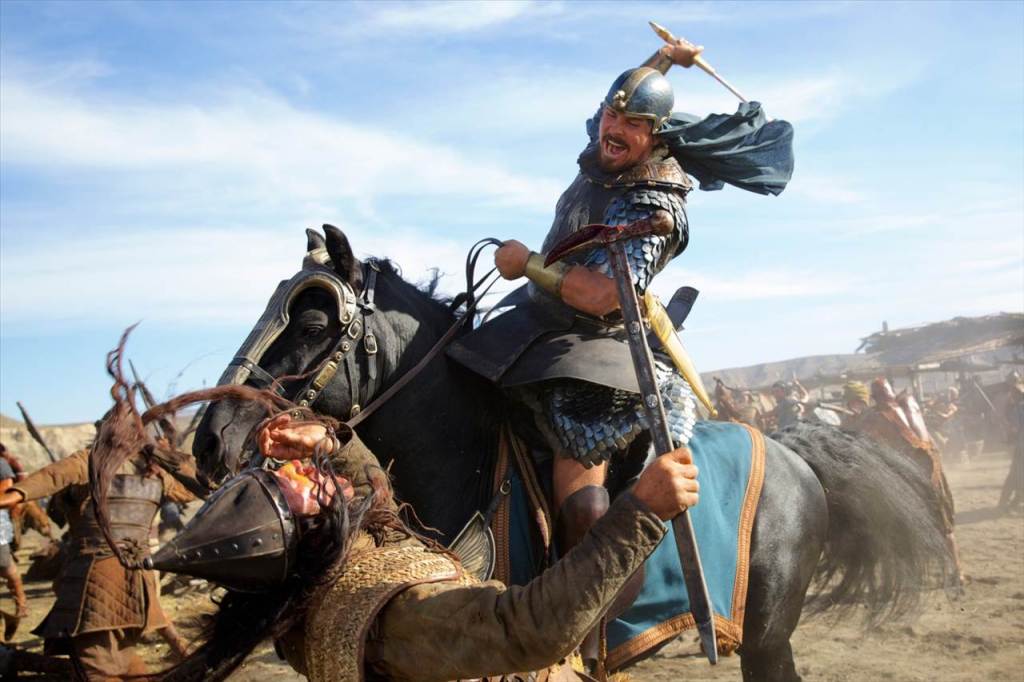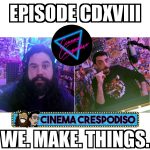Well this is unfortunate. Is there any worse feeling for a movie-goer to finally see a much anticipated film and then come out of the other side realizing that it was months of build up to nothing but disappointment? “Exodus: Gods and Kings” surely has its moments and things about it that work, but it doesn’t come together in the way that was surely hoped by everyone involved when they heard the words “Ridley Scott” and “biblical epic” in the same pitch.
“Exodus: Gods and Kings” (the unwieldy subtitle added after 20th Century FOX couldn’t secure the rights to the title “Exodus“) is the story of Moses (Christian Bale) and how he got 400,000 Hebrews out of Egyptian slavery, though not without some help from God and some well timed plagues of…well…biblical proportions. But before we get anywhere near there (you know, the good stuff), we have to set up Moses and his relationship to both the Pharaoh and his son Ramses (Joel Edgerton), and this takes a good portion of the movie. This problem with this set up is that Ramses’ intentions and true feelings are never really shown, so we get two Ramses in one. First there is the Ramses who grew up with Moses like a brother and who cherishes him and has great affection for him; and then there is the Ramses who is immediately distrustful of Moses and is afraid that he will somehow rise up and take power from him in Egypt, despite the fact that Moses is not the actual son of the Pharaoh. So out of one side of his mouth, he declares his love for Moses, and out of the other side of his mouth he is calling for him to be exiled. This guy is confused, and confusing, and as such, muddles the movie a little.
And then there is Moses, who finds out he is Hebrew himself and must reconcile his love for his Egyptian family with this sneaking suspicion inside him that his people are actually the ones being whipped and subjugated to horrible Egyptian rule. How can he sit back and enjoy the fruits of the labor of the people from whom he comes from, and does he even believe it? The problem with THIS part of the story is that this conflict is set up but weirdly it does not feel like it gets explored very much. I remember only one moment in which Moses mentions having affection for his adopted family and how that was a struggle for him, but we never really see the struggle. At no point is Moses forced to make a decision regarding his heritage and his home. His secret lineage is ratted out to Ramses (after he became the Pharaoh) and then he is exiled because he MAY be a Hebrew. At this point in the story, neither Ramses or Moses are even convinced that this is true, but they both forge ahead as if it may be, just in case I guess.
This beginning takes FOREVER, and the little bit of actual exploration of the characters and their problems feels like it could have been fit into half the amount of screentime. But no, instead we have to watch a scene in which Moses and Ramses lead the Egyptian army on a sneak attack against a rival tribe of Hittites, hence giving us the now prerequisite scene of two large groups of digital people in an open filed charging at each other. And since this is Ridley Scott, this whole battle is well done and some crazy things happen, but I’ve mentioned this before, after “Lord of the Rings: The Return of the King” and the EPIC battles in that film, how can anyone ever hope to top that? What can be done that could be better? This battle has more chariots? This shit wasn’t necessary. Hell, it wasn’t necessary to set up the conflict of the story in its original publication, which is, you know, THE HOLY BIBLE, but instead here we have people who seem to be thinking, “we know this ancient story has persevered through the ages because it is a tight, well told story, but we are gonna add a bunch of shit anyway because Hollywood.” And then after the battles, we get scenes of Moses hanging out with the Pharaoh, who is laughably played by John Turturro. And that is no diss on Turturro, who is fine enough in the role, it is just that it feels absurd to see him pop up in this movie at all, let alone as the Pharaoh. He could have played any number of roles in this movie, but they just happened to pick the worst one for him. Also Sigourney Weaver as his wife? If she didn’t have so little to do, I would have called that ridiculous as well. But fact is, she is barely in the movie, just there long enough to throw some shade on Moses.
After Moses is exiled, he comes across a little village in the middle of nowhere, falls in love with the one good looking lady in the whole lot of ’em, and they get married and he settles down to be a shepherd and raise a family. And of course, this takes forever, and includes a hilariously chaste honeymoon scene. It’s not until after Moses is told about a sacred mountain and goes up the mountain just because he was told he can’t that the movie starts to really get interesting. There is a quick storm and a flash flood and Moses gets clocked in the face and again in the back of the head with huge rocks. When he comes to, likely with a concussion and possibly with brain damage, he sees the Burning Bush and he hears the voice of God. Here Ridley Scott and his writers took a turn from the original story which is actually quite interesting, which is they then show us God in the form of a young boy, who eggs Moses on and gets him to go back to Egypt to see if he can convince Ramses to let the Hebrew slaves free.
From this point forward, we do get some interesting stuff. Moses is shown repeatedly talking to this young boy and debating him about how to go about this whole “freeing of the slaves” thing, and they butt heads a little regarding their preferred methods. This part feels like the one part of the Old Testament (or the Torah, depending on who you ask) that they got right, which is how God spoke to people directly much more back in the day and how certain leaders didn’t just automatically capitulate to God and his commands but sometimes questioned them and asked why. And then at one point God is like, “you know what, Moses? I don’t think I really need you so much on this one,” and then the plagues are unleashed.
This is the best part of the movie, and also maybe the quickest section of the movie? Once the plagues comes, they come hard and fast, one right after the other. And then there is a scene in which Ramses has a council and one guy explains how each plague has happened and they are really a chain reaction of events, no hocus pocus about it, just science going horribly wrong for them. And then Moses does confront Ramses and he’s like, dude, you need to listen to me and let these peeps out of here, and instead Ramses is like, nope, Ima start hanging fools. So God has to keep going until Ramses makes the right decision, and when God reveals his final plan to Moses, Moses is mortified and begs for it not to happen. If you are familiar with this story, then you know the Angel of Death is on the way, and unlike the other plagues, Ridley Scott offers up no explanation for this event. It just happens because God wanted it to happen. The same God who told Moses that this was an okay thing to do because of the hundreds of years of oppression perpetuated by the Egyptians. The same God who no one else can see or hear, so when someone is sneakily watching Moses from the distance, they see him ranting and raving and hollering at no one, and having a full conversation all by himself. Is Moses crazy? A little touched in the head, thanks to those falling rocks? That is definitely a possibility in this particular version of the story. Is this reading of Moses’ story a bad thing? Not at all, it is actually a very interesting approach to this story, and I would have liked a little more questioning of Moses’ sanity by the others. But this never really becomes a problem for anyone and doesn’t result in much conflict. It is more like a reason for Ridley Scott, a noted non-believer of religion, to justify to himself scenes of his main character communing with God directly.
I’m going to talk about the ending of the movie here, though I don’t think it can be considered a spoiler, considering this story is thousands of years old, but I want to note that the whole ten commandments portion of this story is very weirdly truncated, like they wanted to spend more time with Moses when he was living in the palace in the beginning and then ran out of time and were like “let’s just crank this part out and be done with this thing.” So we get a short scene in which Moses and God hang out on a mountain and Moses creates the ten commandments on the stone tablets, and then there is a very short scene in which a very old Moses is in a cart surrounded by thousands of people walking through the desert, and then the movie ends, and this bums me out because we already got a bunch of movies about the freeing of the slaves and the parting of the sea and all that, but there are so many more intense and interesting stories that happen in that desert, as this huge group of people wander around for decades, alternating between turning their backs on God and then coming back to him, with all sorts of craziness and adventures and miracles along the way, but we don’t even get a hint of that here. They cross the parted sea, then the ten commandments happens within minutes, then Moses is old as fuck, and then the end. This is a bummer.
Actually this whole movie is kind of a bummer. It is a bit of a slog, as it takes its sweet time getting to where it needs to go, and then when it gets to the interesting stuff, they fly through all of that, likely so they can get to more scenes of characters standing around talking ominously and having grave conversations about what is happening in the movie. Sure there are some big CG shots and plenty of spectacle, but for most of the movie, it has the mood and tenor of a funeral. I am not saying this thing had to be a rip roaring good time, but there really is no joy in this movie at all, it is just oppressive and heavy the whole time. And at nearly three hours, that is just too much.




 Spoiler Bonus Episode – IT
Spoiler Bonus Episode – IT #105 – How to Protest Properly
#105 – How to Protest Properly #418 – We. Make. Things.
#418 – We. Make. Things. Review: ‘Two Days, One Night’
Review: ‘Two Days, One Night’
Leave a Reply
You must be logged in to post a comment.